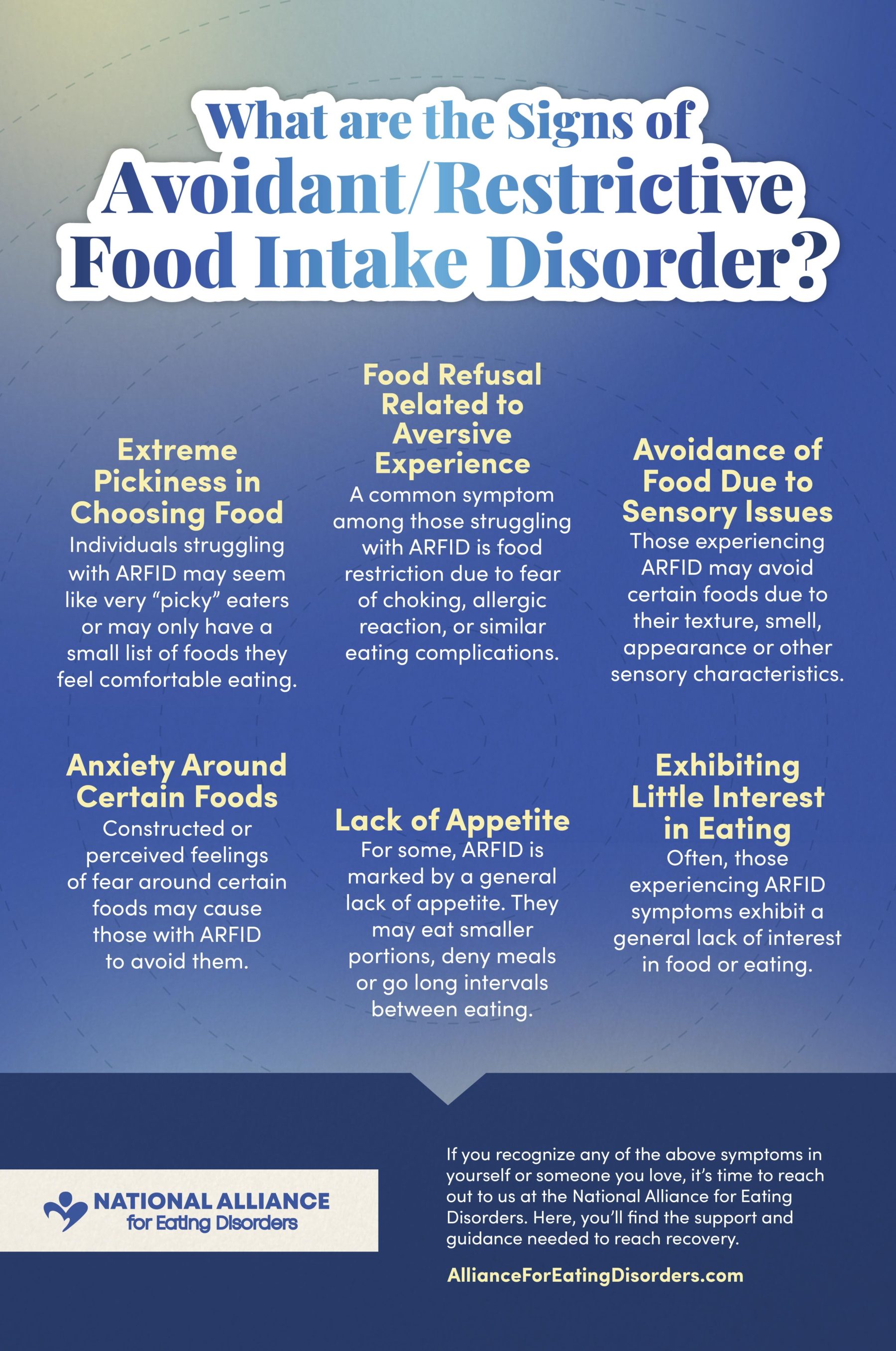What Is Avoidant/Restrictive Food Intake Disorder?
Avoidant/Restrictive Food Intake Disorder (ARFID), sometimes known as “selective eating disorder,” is an illness affecting eating or feeding behaviors that can significantly impact a person’s physical and mental health. Those who struggle with this disorder are typically unable to meet their body’s nutritional or energy needs, caused by a refusal to eat food or a tendency to avoid certain types of foods.
People with ARFID tend to have a lack of interest in eating or food in general. If you struggle with ARFID, you may find yourself avoiding foods based on textures, smells, or other sensory characteristics. Some individuals with ARFID may show concern or be obsessive about the consequences of eating certain foods, which are unrelated to their body image or weight.
If you are struggling with Avoidant/Restrictive Food Intake Disorder, it is important to know that you are not alone. The Alliance is here and we understand what you are going through. While it may not seem feasible now, it’s important to know that life in full recovery is possible. Our team of experts is uniquely trained to seek out and connect you with the necessary resources to get you there. Connect with us at Findedhelp.com to find eating disorder treatment options near you today, or continue reading to discover more about Avoidant/Restrictive Food Intake Disorder.

Signs & Symptoms of Avoidant/Restrictive Food Intake Disorder
Avoidant/Restrictive Food Intake Disorder is an eating disorder that denies the body the necessary nutrients needed to grow and function normally. Recognizing the signs of someone struggling with ARFID is extremely important in mitigating health risks. While it is not a comprehensive list, the following symptoms are some of the most common among those struggling with Avoidant/Restrictive Food Intake Disorder:
- Exhibit little interest in the act of feeding or eating
- Extreme pickiness in choosing food
- Difficulty chewing food
- Lack of appetite
- Social isolation
- Anxiety when presented with “fear” foods
- Vomiting or gagging after exposure to certain foods
- Trouble digesting specific types of foods
- Dependence on feeding tubes or nutritional supplements
- Avoidance of specific food items as related to sensory features (i.e. texture, color, taste, smell)
- Food refusal related to aversive or fear-based experience
- For adults, weight loss; for children, failure to gain weight
While picky or selective eating is a common occurrence among children and some adults, it becomes a problem when there are not enough calories consumed to develop properly and maintain basic bodily functions. It is still unclear exactly what conditions put someone at risk to develop ARFID, but researchers do know that it is more likely to develop among people with ADHD and intellectual disorders, autism spectrum disorder (ASD) and anxiety disorders.
If you or a loved one is experiencing any of the above symptoms, we recommend seeking a diagnosis from a trained professional. The Alliance is here to help. Visit our national, interactive database to find eating disorder treatment options near you today. For a complete guide to DSM-5 Diagnosis Criteria for Avoidant/Restrictive Food Intake Disorder, visit the NCBI Website.
Side Effects of Avoidant/Restrictive Food Intake Disorder
Prolonged experiencing of Avoidant/Restrictive Food Intake Disorder can cause a number of serious health complications. In children, this can include stalled weight gain and stunted growth. That’s why early intervention is extremely important. The following are just some of the dangers of untreated Avoidant/Restrictive Food Intake Disorder:
- Cardiac complications
- Growth failure or increased risk to not thrive in adolescents
- Kidney and liver failure
- Bone density loss/osteoporosis
- Anemia (iron deficiency)
- Electrolyte imbalances
- Low blood sugar
- Gastrointestinal problems: constipation and/or bloating
- Fatigue
- Hair loss
- Difficulty concentrating
ARFID can be a fatal disorder. It is extremely important to seek treatment if you or a loved one is experiencing any of the above side effects. The Alliance is here to help. Connect with us at Findedhelp.com to find eating disorder treatment options near you today.
Avoidant/Restrictive Food Intake Disorder Diagnosis & Treatment
A life in complete recovery is possible. If you or a loved one is struggling with Avoidant/Restrictive Food Intake Disorder, don’t feel like you have to suffer alone. The Alliance is here to help. Visit our national, interactive database to find eating disorder treatment options near you today. Learn more about what to expect out of an eating disorder treatment team here, and discover recovery programs, services and support groups with The Alliance here. You are not alone! Help is available and recovery is possible with The Alliance.
Avoidant/Restrictive Food Intake Disorder and Loved Ones
If someone you love is struggling with Avoidant/Restrictive Food Intake Disorder, it can be a scary and difficult time for everyone involved. If your loved one is displaying any of the signs and symptoms covered above, seek help immediately. Early detection and intervention may increase the likelihood of recovery. It is also important that you, the family and friends of someone going through an eating disorder, get help and support for yourselves. Please consider attending family therapy and/or a family and friends support group. The Alliance is here to support you, too. Visit our page for loved ones to find out more about helping a loved one through an eating disorder, or sign up for our virtual friends and family support group here.
Featured Posts
December 02, 2022
Is There a Link Between Genetics and ARFID?
READ MORE
June 12, 2020
ARFID: Educating our peers and healthcare providers
READ MORE
Find Treatment Today
A life in complete recovery is possible, and we are here to help connect you with the resources to get there.
